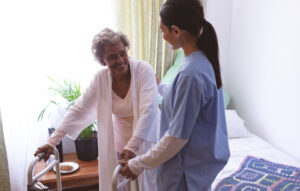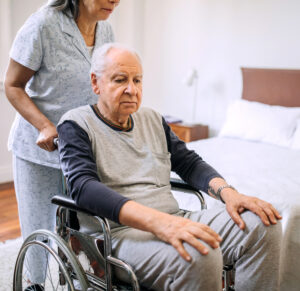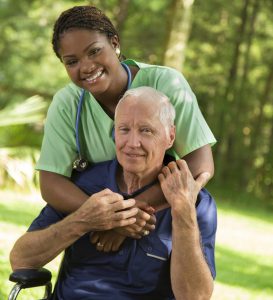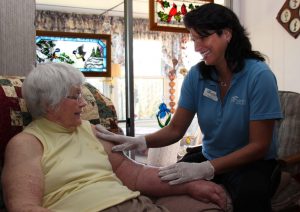Samaritan is a proud provider of Dementia Care and uniquely distinguished as a GUIDE provider by the Centers for Medicare and Medicaid (CMS). Click to learn more.
(856) 596-1600 available 24/7 Refer Now

 According to the American Stroke Association, a stroke is the fifth leading cause of death in the United States and can happen at any time. A stroke occurs when blood supply to the brain is reduced or interrupted, preventing the brain from receiving nutrients and oxygen.
According to the American Stroke Association, a stroke is the fifth leading cause of death in the United States and can happen at any time. A stroke occurs when blood supply to the brain is reduced or interrupted, preventing the brain from receiving nutrients and oxygen.
While ultimately this depends on the severity of the stroke and the area of the brain that is affected, stroke patients often suffer from residual effects, such as brain damage. These effects can lead to the patient’s health deteriorating. In these cases, hospice care after stroke may be their best option.
 Choosing hospice after your loved one’s stroke is an important decision. Hospice care can help preserve their quality of life, ensure their dignity, and maintain their comfort, especially as their needs intensify.
Choosing hospice after your loved one’s stroke is an important decision. Hospice care can help preserve their quality of life, ensure their dignity, and maintain their comfort, especially as their needs intensify.
Hospice provides an extra layer of support through a team of trained professionals. The team includes a board-certified physician, hospice-certified nurse, social worker, spiritual support counselor, certified home health aide, and a volunteer.
Read below to see how the hospice team can help:
 The certified home health aide will bathe your loved one and change their bed linens. The aide is trained to perform these intimate tasks gently and comfortably to maintain your loved one’s dignity.
The certified home health aide will bathe your loved one and change their bed linens. The aide is trained to perform these intimate tasks gently and comfortably to maintain your loved one’s dignity.Most importantly, when you call hospice after a stroke, you will experience peace of mind thanks to 24/7 phone access to stroke and hospice experts. If you have a question or need additional help, call Samaritan 24/7 at (856) 596-1600.
 Samaritan is the premier provider of hospice care for stroke patients in South Jersey and meets all the criteria in a hospice organization as recommended by Consumer Reports. According to a recent article, you should choose a hospice that is:
Samaritan is the premier provider of hospice care for stroke patients in South Jersey and meets all the criteria in a hospice organization as recommended by Consumer Reports. According to a recent article, you should choose a hospice that is:
Samaritan exceeds those recommendations by being a non-profit organization with:
Two inpatient hospice centers:
Samaritan offers inpatient centers for severe pain and symptom management in Voorhees and Virtua Memorial in Mount Holly. The Centers are meant for short-term stays for stroke patients who are experiencing severe muscle or joint pain, contractures, or other symptoms like difficulty breathing or agitation.
 Complementary Therapies:
Complementary Therapies:
Samaritan offers above-and-beyond services as part of its hospice and stroke program, such as complementary therapies. Complementary therapies includes music, massage, and pet therapies. There are many benefits to these therapies in a hospice setting. Music therapy can help stroke patients with pain, anxiety, and grief. Massage therapy can help with anxiety, muscle tension, and joint function. In addition, visits from specially certified therapy dogs can help stroke patients and their family members feel relaxed and comforted.
Professional Grief Counseling for Patients and Families:
Another benefit to choosing Samaritan are on-staff, professionally trained grief counselors. Grief support counseling is available for 13 months after the loss of your loved one. Grief is a normal, universal reaction to loss. You’ve suffered one – and no one else can grieve that loss for you. However, Samaritan can stand with you so you do not have to go through it alone. Individual counseling and support groups are available.
Someone is typically eligible for hospice when their physician certifies that they are terminally ill – or has six months or less to live. However, do not wait for your physician to bring up hospice care. Be your loved one’s healthcare advocate and inquire about hospice care sooner than later. Earlier access to hospice care ensures that you can experience the many benefits of this extra layer of support.
Hospice eligible stroke survivors must exhibit one or more of the following hospice criteria:
Let our expert nurses determine if your loved one living with the effects of a stroke is eligible for hospice care in South NJ. Call us 24/7 at (856) 596-1600.